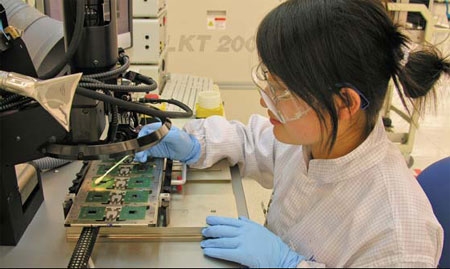Intel inside Chengdu
Updated: 2012-04-20 11:14
By Liu Lu and Li Yu (China Daily European Edition)
|
|||||||||||
|
 Intel's chip assembly plant in Chengdu. Provided to China Daily |
Global chip major spearheads city's high-tech transformation
Chengdu might not have been top of the list as an investment destination for most multinational companies. The capital of Southwest China's Sichuan province lags industrialized cities like Shenzhen and Guangzhou, and bigger rivals like Shanghai or Beijing.
But Chengdu is also one of the best examples of a successful investment by a US company in China.
"Intel Inside Chengdu" is how global chip major Intel describes its experience. The company's first contact with the city was in 1993, when it decided to set up a $375 million (285 million euros) chip assembly and testing plant in Chengdu. Since then Intel has made investments of more than $600 million in the region.
"Our business in Chengdu has developed at an astonishing speed," says Gu Yi, the Intel China spokesperson for western China.
Gu says it is the huge development potential of Chengdu that has prompted the US company to commit further investments in the region. "For Intel, having tighter connections with Chengdu seems like the right decision."
According to Gu, the Chengdu factory is the largest chip packaging and testing center among the five global facilities that Intel has and also one of the three largest wafer pretreatment plants in the world.
Mobile processors made by Intel currently enjoy more than 90 percent of the global market share, with chips made in Chengdu accounting for more than 50 percent of the total.
"It is no exaggeration to say that nearly half of the world's laptops are configured with a chip manufactured by Intel's Chengdu branch," Gu says.
In 2009, Intel decided to optimize its global manufacturing resources by relocating its assembly and testing factory in Shanghai to Chengdu. This, Gu says, was "an important step in Intel's global restructuring and strategic planning".
The integration also helped Intel boost production capacity at Chengdu and also achieve robust sales growth of 50 percent every year. In January this year, the Chengdu unit rolled out its 1-billionth chip, considering that it had produced just 480 million chips in 2010.
"The growth (in Chengdu) has been really exciting," Gu says, but the real significance of Chengdu for Intel is in the huge talent pool its provides.
"The universities in Chengdu, especially the technical universities, provide the best new talent in the industry," she says, adding that Intel absorbs as much of the fresh local talent it can every year.
"The large talent pool was one of the big draws for Intel when it decided to locate and consolidate its business in Chengdu," Gu says, adding that most of the 3,500 employees in Chengdu are locals.
In January, Intel decided to set up a distribution center in the southwestern city, the third of its kind in China after Shanghai and Shenzhen.
Ge Jun, executive director of Intel China, said in a recent interview that the surging need for microprocessors in western China was the primary reason that Intel decided to build another distribution center in China.
"With other global PC makers and ventures contemplating expansion in western China, Intel plans to ensure timely chip supplies with the Chengdu distribution center," Ge said.
He said the new center will also upgrade Intel's response to customers in western China and also ensure customers get the newest Intel products and technologies as and when they are launched.
"The expansion of Intel's business in Chengdu demonstrates the chipmaker's confidence in the city," says He Li, director of the Chengdu Economic and Information Committee.
He says the Intel Chengdu unit has also prompted many downstream suppliers to set up units in the city and thereby create a high-tech industrial cluster.
He believes that the Intel distribution center in Chengdu will not only help facilitate the development of Chengdu's logistics industry, but also provide strong support for Sichuan to capitalize on the government's go-west strategy.
Contact the writers through liulu@chinadaily.com.cn
Today's Top News
Rescuers race against time for quake victims
Telecom workers restore links
Coal mine blast kills 18 in Jilin
Intl scholarship puts China on the map
More bird flu patients discharged
Gold loses sheen, but still a safe bet
US 'turns blind eye to human rights'
Telecom workers restore links
Hot Topics
Lunar probe , China growth forecasts, Emission rules get tougher, China seen through 'colored lens', International board,
Editor's Picks

|

|

|

|

|

|





